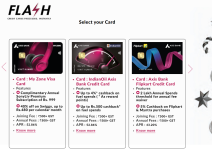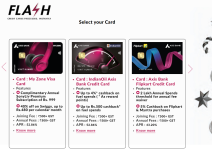do correct me here (I definitely might have missed something):
Magnus:
Total spends in a year (as per above example): ~3,60,000
Online spends: 3,00,000
Offline spends: 60,000
Fee Paid: 11,800
Voucher obtained: 10,000
Actual fee paid: 1,800 (I ignored the opportunity cost here because that might confuse more)
that user has no travel requirement or only once in two years travel + need cashback/equivalent vouchers
so, to recover the 1,800 at the value of say 5% (triple rate, exceptional case)
this person has to spend: 36,000
Now this person recovered paid amount, remaining 3,24,000
Online (5% - same as above exceptional rate) = 13,200
Offline (2.4% - same exceptional rate) = 1,440
Overall return rate: ~4%
--------------------------
Lets say, this person took Millennia card
Fee: 1180
Cashpoints obtained: 1000
Actual fee paid: 180 (opportunity cost here very very less compared above scenario since direct cash, anyway ignore)
so, to recover the 180 at the value of say 5% (unlike above card, here direct benefit - its not exceptional case but rather direct)
this person has to spend: 3,600
remaining: 3,56,400
Online: 14,820 + 1,000 (because 2,96,400 online spends in a year requires atleast 1L/Quarter, considered 1 quarter here 1%)
Offline: 600 (1%)
Overall return rate: ~4.56%
--------------------------------
Not saying Magnus is bad card here, obviously if that user utilizes BMS 4 or 5 times - it will be even more. The point is not every question has 'Magnus answer'. If that person took magnus in this scenario have to find answers like 'when will reward points credited', 'how to spend 1L without actually spending', 'whether this transaction comes under eligible category or not', 'any one purchase travel vochers', etc. for 30k spends this much attension not required, IMO.
Again personal views, may not be suitable to all and if one can utilize like you said it might provide more value, my views based on mentioned scenario only.








